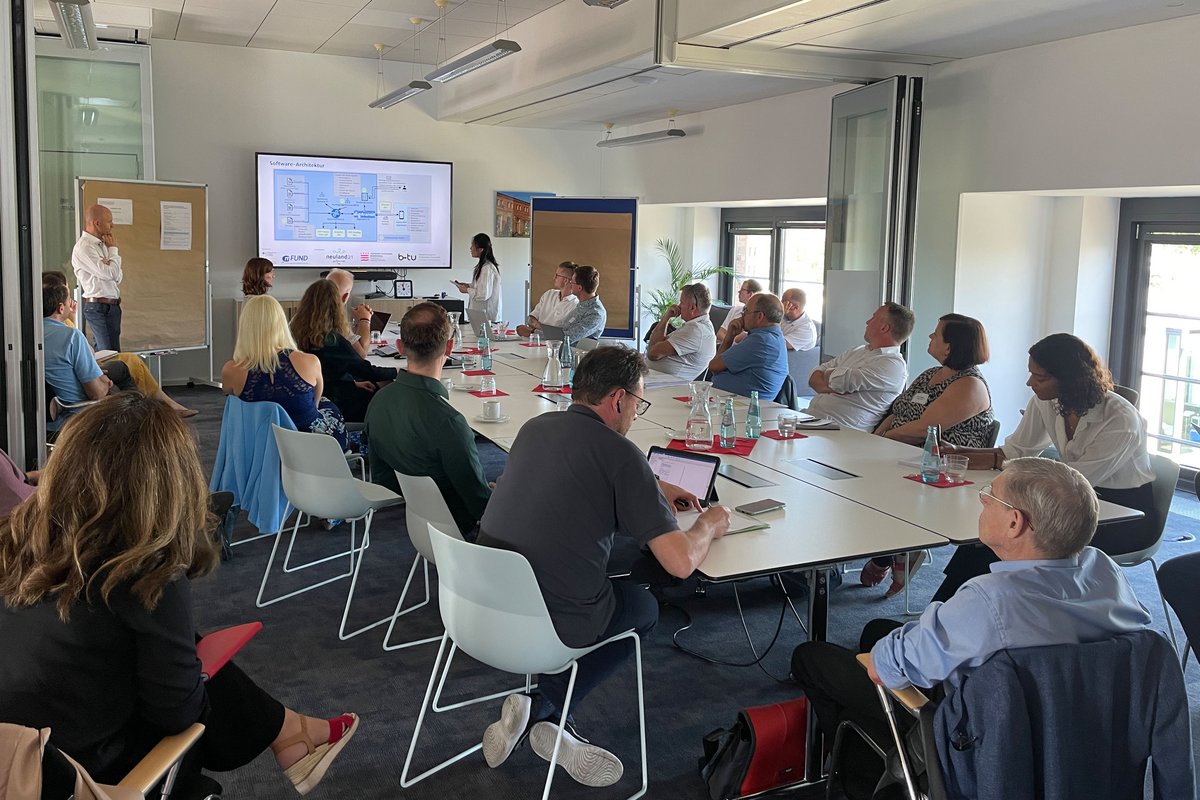Digital solutions for needs-based mobility
Transportation services, especially in rural regions, are on the rise throughout Germany. In the research project "Open Source Software for Rural On-Demand Transport" (OSLO), neuland21 e.V., in cooperation with the Brandenburg University of Technology (THB) and the Brandenburg University of Technology Cottbus-Senftenberg (BTU), has researched and confirmed the technical feasibility of a license-free software solution for the integration of rural on-demand transport into the existing public transport network. The results of OSLO will now be published in a final scientific report and presented at the mFUND conference on December 12, 2023.
The aim of the OSLO project was to close gaps in rural public transport with the help of on-demand services, i.e. demand-responsive mobility services such as regional on-call buses. As a result, municipalities, in particular in structurally weak regions, could meet this challenge without high license fees by using open-source software. The system that has now been designed makes it possible to efficiently map on-demand transportation via digital platforms such as the open source mobility platform "bbnavi". Three specific use cases have also been identified: commuting between home and work, cross-connections between districts and evening off-peak times. Daily commuting offers the greatest potential, with faster connections and shorter distances to stops made possible by on-demand services.
Demand-responsive mobility through open source software
The main objective of the project was to explore the feasibility of a license-free software solution for rural on-demand transport. This was demonstrated by adding new functions to existing open source software. Petra Hofstedt, Professor at the BTUcommented: "Many rural regions are facing the challenge of making public transport more attractive and demand-oriented. With OSLO, we have taken a big step in this direction."
The project results were presented at the final workshop at the Digital Agency Brandenburg (DABB) in Potsdam in September 2023 and discussed intensively with various stakeholder groups. "The reactions were overwhelmingly positive. It became clear once again how great the need for such a solution is," says Alexander Klinge from neuland21 e.V.
Final report confirms feasibility
The publication of the final scientific report provides an in-depth insight into the project results and is now available online as a PDF. Prof. Dr.-Ing. André Nitze from THB emphasized: "The technical feasibility and economically viable operation with open source software are no longer wishful thinking, but feasible reality. With OSLO, we have created a basis that will not only be used in follow-up projects, but will also continue to play an important role in teaching and research."
Save the date: mFUND conference on December 12, 2023
The project participants cordially invite you to discuss the results in person at the "Rural Mobility" expert forum at the mFUND conference on December 12, 2023 in Berlin. Thematically related mFUND projects such as "Kombinom_2" and "CargoSurfer" will also be represented there. Information on the mFUND conference: https://www.mfund-konferenz.de.
The OSLO research project is a prime example of how innovative ideas, interdisciplinary collaboration and the use of open source software can strengthen rural areas and make them fit for the future. The Federal Ministry for Digital and Transport (BMDV) has funded the innovative project with around 90,000 euros over a period of one year.
About the mFUND funding program of the Federal Ministry for Digital and Transport (BMDV)
As part of the mFUND innovation initiative, the BMDV has been funding data-based research and development projects for the digital and connected mobility of the future since 2016. The project funding is supplemented by active professional networking between stakeholders from politics, business, administration and research and by the provision of open data on the Mobilithek. Further information can be found at www.mFUND.de.
Brandenburg University of Applied Sciences
Founded in 1992, Brandenburg University of Applied Sciences is a modern campus university located in Brandenburg an der Havel. The university offers courses in Computer Science and Media, Engineering and Business. As part of the project, the key research area "Digital Transformation" at THB was responsible for the requirements for the software architecture and embedding it in the "bbnavi" mobility platform.
neuland21
As a think & do tank based in Bad Belzig, neuland21 deals with the question of how digitalization can help to improve the quality of life in rural areas. In the OSLO project, the Mobility programme area was responsible for transport policy and transport planning aspects as well as the development of organizational models.
Brandenburg University of Technology Cottbus-Senftenberg (BTU)
The BTU uses its scientific expertise to develop practical solutions for shaping the major issues of the future and transformation processes worldwide. In doing so, it is aware of its special responsibility for progressive and sustainable development in the region. Interdisciplinary clusters and close cooperation with partners in science and industry enable profiling, international connectivity and successful projects in tackling these challenges. The Chair of Programming Languages and Compiler Construction at BTU Cottbus-Senftenberg has many years of experience in the field of planning and optimization processes. It played a central role in the project by analyzing and designing the intermodal routing algorithm.
Press contact
neuland21 e.V., Alexander Klinge, Tel: +49 156 78 606 202, E-Mail: alexander.klinge(at)neuland21.de

